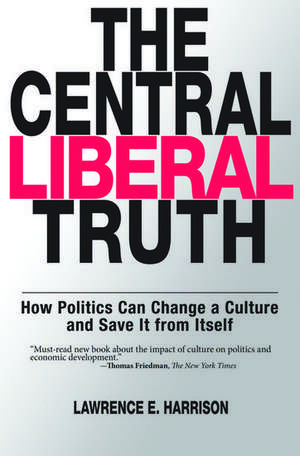The Central Liberal Truth: How Politics Can Change a Culture and Save It from Itself
Autor Lawrence E. Harrisonen Limba Engleză Paperback – 10 iul 2008
Preț: 145.74 lei
Preț vechi: 155.39 lei
-6% Nou
Puncte Express: 219
Preț estimativ în valută:
27.91€ • 28.79$ • 23.13£
27.91€ • 28.79$ • 23.13£
Carte tipărită la comandă
Livrare economică 10-15 februarie
Preluare comenzi: 021 569.72.76
Specificații
ISBN-13: 9780195331806
ISBN-10: 019533180X
Pagini: 288
Dimensiuni: 155 x 235 x 21 mm
Greutate: 0.45 kg
Editura: Oxford University Press
Colecția OUP USA
Locul publicării:New York, United States
ISBN-10: 019533180X
Pagini: 288
Dimensiuni: 155 x 235 x 21 mm
Greutate: 0.45 kg
Editura: Oxford University Press
Colecția OUP USA
Locul publicării:New York, United States
Recenzii
"Must-read new book about the impact of culture on politics and economic development."--Thomas Friedman, The New York Times
"It is not often that a book appears of such intellectual force and power that it can completely change the debate on an issue. Larry Harrison's book The Central Liberal Truth has done that for development theory. He has made an argument so compelling that it can not be ignored by even those who disagree with his research. This book is a must read."--Andrew Natsios, former Administrator, U.S. Agency for International Development
"Nothing is so important and tenacious as culture (values and institutions) in shaping economic performance, and nothing so decisive as economic performance in determining political and social possibilities and structure. This book is a global, historical, empirical approach to these connections, as exemplified by the major stories of success, failure, and cases in between. I can think of no better entrance to the topic, both for what it teaches and the way it invites and prepares the reader to continue. A gateway study."--David S. Landes, author of The Wealth and Poverty of Nations: Why Some Are So Rich and Some So Poor
"Harrison takes up the question that is at the center of politics today: Can we self-consciously change cultures so they encourage development and modernization...? Harrison observes that gigantic investments in education, and especially in improving female literacy, usually precede transformations. Chile was highly literate in the 19th century, and in 1905, 90 percent of Japanese children were in school. These investments laid the groundwork for takeoffs that were decades away. Harrison points to many other factors--leaders who encourage economic liberalization, movements that restrict the power of the clerics--but the main impressions he leaves are that cultural change is measured in centuries, not decades, and that cultures are separated from one another by veils of complexity and difference."--David Brooks, The New York Times
"Lawrence Harrison's previous writings have made him a leading, perhaps the leading, scholar exploring, analyzing, and documenting the central impact of culture on how society develops, or fails to develop, economically and politically. In The Central Liberal Truth, he draws on his immense knowledge and long experience to spell out the ways societies suffering from cultural attributes unfavorable to development can overcome these obstacles. The Central Liberal Truth is an impressive, persuasive, and indispensable book for anyone interested in improving the conditions of human life in poor countries."--Samuel Huntington, author of Who Are We: The Challenges to American National Identity and The Clash of Civilizations and the Remaking of World Order
"Authors who emphasize the role of culture in development are often accused of consigning whole peoples to backwardness because they are locked into the wrong values. Larry Harrison takes culture seriously, but shows that culture evolves, and offers a practical agenda for cultural change."--Francis Fukuyama, author of Nation-Building: Beyond Afghanistan and Iraq and The End of History and the Last Man
"This important book represents the culmination of a decades-long process of professional experience, research and writing, the achievement of which is a major enrichment of the study of both the nature of societies and of their strengths and weaknesses."--Vineyard Gazette
"A book of enormous importance and startling originality. Harrison has pulled off an amazing intellectual feat. He has drawn our attention both to the centrality of culture in historical outcomes and to the ability of good public policy to reshape economic and political history."--Fouad Ajami, Majid Khadduri Professor and Director of Middle East Studies at Johns Hopkins University, School of Advanced International Studies
"It is not often that a book appears of such intellectual force and power that it can completely change the debate on an issue. Larry Harrison's book The Central Liberal Truth has done that for development theory. He has made an argument so compelling that it can not be ignored by even those who disagree with his research. This book is a must read."--Andrew Natsios, former Administrator, U.S. Agency for International Development
"Nothing is so important and tenacious as culture (values and institutions) in shaping economic performance, and nothing so decisive as economic performance in determining political and social possibilities and structure. This book is a global, historical, empirical approach to these connections, as exemplified by the major stories of success, failure, and cases in between. I can think of no better entrance to the topic, both for what it teaches and the way it invites and prepares the reader to continue. A gateway study."--David S. Landes, author of The Wealth and Poverty of Nations: Why Some Are So Rich and Some So Poor
"Harrison takes up the question that is at the center of politics today: Can we self-consciously change cultures so they encourage development and modernization...? Harrison observes that gigantic investments in education, and especially in improving female literacy, usually precede transformations. Chile was highly literate in the 19th century, and in 1905, 90 percent of Japanese children were in school. These investments laid the groundwork for takeoffs that were decades away. Harrison points to many other factors--leaders who encourage economic liberalization, movements that restrict the power of the clerics--but the main impressions he leaves are that cultural change is measured in centuries, not decades, and that cultures are separated from one another by veils of complexity and difference."--David Brooks, The New York Times
"Lawrence Harrison's previous writings have made him a leading, perhaps the leading, scholar exploring, analyzing, and documenting the central impact of culture on how society develops, or fails to develop, economically and politically. In The Central Liberal Truth, he draws on his immense knowledge and long experience to spell out the ways societies suffering from cultural attributes unfavorable to development can overcome these obstacles. The Central Liberal Truth is an impressive, persuasive, and indispensable book for anyone interested in improving the conditions of human life in poor countries."--Samuel Huntington, author of Who Are We: The Challenges to American National Identity and The Clash of Civilizations and the Remaking of World Order
"Authors who emphasize the role of culture in development are often accused of consigning whole peoples to backwardness because they are locked into the wrong values. Larry Harrison takes culture seriously, but shows that culture evolves, and offers a practical agenda for cultural change."--Francis Fukuyama, author of Nation-Building: Beyond Afghanistan and Iraq and The End of History and the Last Man
"This important book represents the culmination of a decades-long process of professional experience, research and writing, the achievement of which is a major enrichment of the study of both the nature of societies and of their strengths and weaknesses."--Vineyard Gazette
"A book of enormous importance and startling originality. Harrison has pulled off an amazing intellectual feat. He has drawn our attention both to the centrality of culture in historical outcomes and to the ability of good public policy to reshape economic and political history."--Fouad Ajami, Majid Khadduri Professor and Director of Middle East Studies at Johns Hopkins University, School of Advanced International Studies
Notă biografică
Lawrence E. Harrison is Senior Research Fellow and Adjunct Lecturer at the Fletcher School at Tufts University. He is the author of Underdevelopment is a State of Mind, Who Prospers?, and The Pan-American Dream, and co-editor, with Samuel Huntington, of Culture Matters: How Values Shape Human Progress. Between 1965 and 1981, he directed USAID missions in the Dominican Republic, Costa Rica, Guatemala, Haiti, and Nicaragua. Harrison was associated with Harvard University's Weatherhead Center for International Affairs for eight years during the period 1981-2001. His articles have appeared in The New York Times, Washington Post, Wall Street Journal, Boston Globe, Atlantic Monthly, Foreign Policy, and The National Interest, among other publications.













